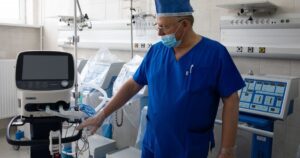
Volunteers donated more than 5,000 units of medical equipment to Ukrainian hospitals, the press service of the Ministry of Health reported on Wednesday.
At the same time, it is specified that in March-April volunteer organizations for medical institutions transferred 5234 units of medical equipment, 7.9 million units. medicines, 58.2 thousand units. consumables, 1.27 million units. other medical support.
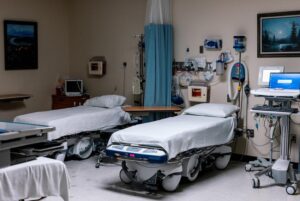
Some 48 regional hospitals will be built in Ukraine in 2022, some of them will be equipped with helipads, Deputy Head of the President’s Office Kyrylo Tymoshenko has said.
“Next year, 48 regional hospitals, both for children and adults, will be built. And most importantly, so that we, together with the Ministry of Internal Affairs, with the State Emergency Service, can help people – helicopter pads will be built in 29 of these hospitals, precisely in order to quickly deliver people to hospitals,” Tymoshenko said, speaking at the all-Ukrainian forum Ukraine 30. Secure Community on Thursday.
According to him, construction of the 201st admission department, as well as 600 outpatient clinics will be completed this year.
In addition, the state will equip medical institutions with computed tomography, ultrasound, X-rays and angiographs.
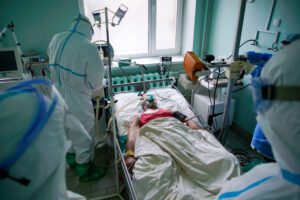
More than 1,200 patients with coronavirus are being treated in the capital’s medical institutions, the vast majority of them are in serious condition, Kyiv Mayor Vitali Klitschko said.
“Today in the city’s hospitals there are more than 1,200 patients with coronavirus. These people are in serious condition. The vast majority of them need oxygen support. Almost 100% of those hospitalized are unvaccinated. And this is one of the main arguments why you need to be vaccinated. Therefore, if you do not care about your health, think about your parents, relatives, friends. Their safety is your responsibility too. I really do not want to go back to the period when more than 50 people died from the virus in a day. And now the virus is more aggressive. The disease is more difficult and causes complications,” the mayor said on the air of the Freedom of Speech (Svoboda Slova) program on Ukraina TV Channel.
According to Klitschko, more than 1.7 million vaccinations were made in Kyiv today, more than 880,000 vaccinations with the first dose and more than 890,000 – with two doses. In particular, almost 90% of teachers are vaccinated. Nevertheless, the percentage of people vaccinated remains high.
“We cannot make vaccination compulsory. But if strict restrictions are imposed, if, for example, you want to go to a catering establishment or to some public events, you will not do this without vaccination. Sorry, but this is a concern, first of all, about the most valuable thing – people’s health and lives,” Klitschko said.
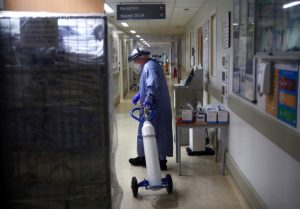
Mobile network operator Kyivstar handed over 55 Biomed JAY-10 oxygen concentrators to 12 hospitals in Kyiv city, Kyiv, Cherkasy, Chernivtsi, Vinnytsia, Poltava, Luhansk, Dnipropetrovsk, Kirovohrad and Khmelnytsky regions, the operator said on Thursday. “Big business is helping society to overcome the coronavirus pandemic. I am glad that we continue providing the necessary equipment to combat the pandemic,” the press service said, citing President of Kyivstar Alexander Komarov as saying.
He also recalled that in 2020, Kyivstar donated 10 Savina 300 Select ventilation and respiratory monitoring devices with consumables for them, 20 Vista 120 patient monitors and 6,851 reusable protective suits for medical workers from 30 referral hospitals.
The project is being implemented in partnership with the Tvoya Opora Charitable Foundation, which monitored medical institutions that receive patients with coronavirus.
According to the report, the charitable organizations with which Kyivstar cooperates have undergone thorough international checks by the VEON parent group regarding the ethics of their business.
As reported, during the quarantine, Kyivstar provided assistance with bonuses to the accounts of almost 70,000 doctors, and for three summer months they were given access to unlimited Internet. The total amount of support provided by the operator totaled approximately UAH 80 million.

Municipal nonprofit organizations (NPO), which most Ukrainian healthcare facilities have become, are trying to develop the healthcare business – which is an absolutely new challenge for them. Being an enterprise means generating profit, controlling and minimizing costs, retaining and developing personnel, soliciting and retaining customers. It is not easy, but possible. How? Some possible activities of municipal hospitals in this regard will be described hereafter.

1. Change organizational setup
In general, the organizational setup of municipal NPOs is not appropriate for doing business. In the years since state-owned enterprises, hospitals have continued to unreasonably retain an excessive number of hospital housekeeping personnel. And this entails funds for the maintenance of unnecessary premises, salaries, etc. There is a room for improvement within such an organization. Downsizing and layoff are painful but vital processes.
An example. The staff of the hospital includes a caretaker, several plumbers, locksmiths, house-painters, welders and others. However, there is also a municipal enterprise nearby that provides the public utilities for the district and includes all these specialties in its staff. It is more cost-effective to procure the relevant services from a specialized municipal enterprise or from private contractors, namely, business entities. The CEO of a municipal NPO knows the specifics of the operations, understands the needs, so the CEO should choose what suits the best for the hospital.
2. Introduce paid services
The list of paid services should be approved by the order of the hospital. In this case, draw up the list on the basis of the Ukrainian Cabinet of Ministers decree No. 1138 “On the Approval of the List of Paid Services Provided by State-Owned and Public Healthcare Facilities and Higher Medical Educational Establishments” dated September 17, 1996.
The goal of the business is to generate income, so provide as much as possible paid services that are beneficial to the enterprise.
Providing services means to bear the cost. The profitability primarily depends on the flow of patients (customers). And the organization of such a flow is already a marketing issue. Yes, that is marketing: advertising and promoting such services in all possible and effective ways to the target audience.
Since, the target audience may be the relevant community, and for some medicinal services it may be, actually, the entire population of Ukraine or not only Ukraine, therefore, it is necessary to develop an appropriate marketing strategy. How? The field for creativity is large.
For instance, the hospital employs a physician to whom people travel for consultation from afar. Why not use this fact in the advertising campaign? The text should be short and strong as well as easy for reading. There are also related non-medical paid services, in particular, improved nutrition, wards, etc. This is a resource for generating additional income for the enterprise as well.
3. Collaborate with insurance companies
The service requires payments. In fact, the patient has to pay for everything that is not paid by the government. There are no other sources of financing for the activities of hospital. Yes, there is also financial assistance from the community within the regional programs, but this is just assistance, and not a permanent source of funding that can be counted on from year to year.
Cooperation with insurance companies shall become an additional source of funding. However, the healthcare facility must provide such a level of service so that it would be interesting for insurance companies to cooperate and attract customers.
As a rule, insurance companies work on the basis of their own, carefully and well-developed contracts. In order to balance the interests of the parties, it is worth to involve a professional lawyer when negotiating such a contract.
The CEO also is entitled to initiate the operation of a non-profit health insurance fund. There are successful examples when community members understand that for cheap constant contributions in case of illness, the patient receives a bonus, namely high-quality medical and related services. Tens of thousands of people become participants in such health insurance funds. And it provides additional ongoing funding for hospitals.
The health insurance funds are created in the form of charitable organizations that do not have the goal of making a profit. Their activities are regulated by the Law of Ukraine “On Charitable Activities and Charitable Organizations.” There are enough examples of statutory documents and descriptions of the activities of such organizations on the Internet.
4. Pool resources
The legislation does not prohibit the municipal NPO from interacting in various forms and pooling its own resources in order to use them effectively. Consolidation is not a panacea, but one of the tools for optimizing all processes: it helps not to duplicate business functions.
Several municipal NPOs operate on the basis of the property of the national healthcare facility. In this case, it is efficient to consolidate resources. You have at least three alternative options for such consolidation at your disposal: to create a municipal economic association of several enterprises or to lease the integral property complex of another enterprise, or to create a joint municipal enterprise. As a result of these steps, you optimize administrative functions, reduce staff, consolidate property and financial resources, expand the list and quality of services, and others.
5. Optimize production functions
This refers to everything, except medical services: laundry, cleaning, food, transport, heating, and others. Instead of keeping old premises to be heated and refurbished and old equipment, procure relevant services from third-party vendors.
For instance, drivers and vehicles owned by the municipal NPO. If we are not talking about the use of fleet vehicles 24/7 and not about specialized vehicles, then it is most probably not profitable to keep fleet vehicles (fuel, repairs, storage) and pay for the work of drivers. It could be more interesting to pay for a taxi service or reimburse physicians for expenses if medical workers had to urgently arrive at the workplace outside of working hours.
Laundry and boiler room. It is worth considering whether it is more profitable to draw up contracts for washing and connecting to city heating networks.
6. Expand service packages under contract with NHSU
Is it expedient and cost-effective for facilities to work on separate service packages? This issue needs to be reviewed separately. There are no overall answers, since make an assessment separately for each facility, taking into account the current situation with personnel, equipment, the needs of the population, competition, and others. Analyze, according to which packages your facility could make an agreement. Think if these services would be in demand.
7. Modernize remuneration system
There is a systematic shortage of medical personnel in many regions of Ukraine. It is the task of every CEO to create such working conditions so that new personnel come to the hospital and the old ones develop and remain. In this case, the issue of labour remuneration comes first.
Usually, the salary of municipal NPOs’ employees is calculated on the basis of the Ukrainian Cabinet of Ministers’ decree No. 1298 “On Remuneration of Employees on the Basis of the Unified Rate Schedule and Coefficients for the Remuneration of Employees of Facilities, Establishments and Organizations of Certain Branches of the Budgetary Sphere” dated August 30, 2002 and the Order No.308/519 of the Ministry of Social Policy and the Ministry of Health “On Streamlining the Conditions of Remuneration of Employees of Healthcare Facilities and Social Protection Institutions” dated October 5, 2005.
The status of a municipal enterprise dictates other principles of remuneration, based on a collective agreement. It is regulated by Ukraine’s Law No.3356-XII “On Collective Contracts and Agreements” dated July 1, 1993.
Modernize the remuneration system in municipal enterprises. Increase salaries by streamlining all processes. At the same time, you have the right to use the tariff system familiar to the industry or any other approaches.
8. Find and launch investment projects
Now investment projects in the medicine sector are more attractive for Ukrainian and foreign investors than it was before. The amount of funds that the government allocates for healthcare is increasing every year and the market is becoming liberal. The field for investments is wide – from the modernization of equipment to the construction of new hospital buildings, the latest medical services, and others.
The investor could enter into a concession agreement for the hospital or its department with the local authorities. As part of the concession agreement, the investor negotiates with the local authorities on a certain guaranteed level of profit (financing), and also implements the business model that has already proven its efficiency in other countries.
He/she invests in refurbishment or modernization, and arranges all processes. For the next 49 years, the investor runs the relevant business and gradually returns his/her investment. The sources of profit are the services bought by:
• Government under agreements with the National Health Service of Ukraine (NHSU);
• Financing of targeted aid programs of communities (districts or cities);
• Patients (out-of-pocket).
Investors are looking for the projects that are attractive for investments within the public-private partnerships, in particular, under concession agreements or joint activities with municipal hospitals. This is an additional source of funds to reorganize the facility into a profitable enterprise.

Oleksii Bezhevets
MBA, Partner at Legal Alliance Company
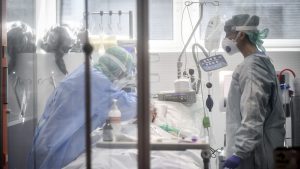
Kyiv needs about UAH 245 million to deploy temporary hospitals at the Sports Palace and exhibition centers, said Health Minister Maksym Stepanov.
“We received information from Kyiv authorities on where they are going to place temporary mobile hospitals, if necessary – it can be either an exhibition center or a Sports Palace. They calculated that they need UAH 245 million,” he said at a briefing on Friday.
Stepanov said that temporary mobile hospitals will create 500 additional beds. To ensure the treatment process in such hospitals, according to calculations, 1,200 medical personnel will be needed.
“We are organizing information now,” he said.